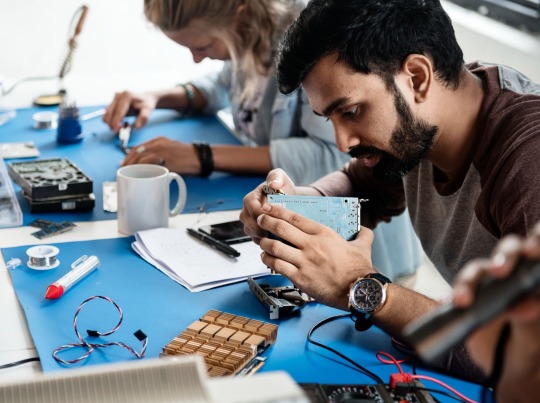#IOT Course
Explore tagged Tumblr posts
Text
Is IoT the Right Engineering Specialization for Tech-Driven Students?
The world is connected. Your phone, your watch, your fridge, and even your car. This growing network of smart devices is known as the Internet of Things (IoT). If you're someone who loves technology and innovation, choosing IoT as your engineering specialization could open up exciting career paths.
It is one of the most in-demand specializations in the tech world today.
Why IoT Is More Than Just a Buzzword
The Internet of Things (IoT) enables devices to become smarter by connecting them to the internet. These devices collect and share data to improve how people live and work. From smart homes and wearable health gadgets to automated vehicles and city-wide monitoring systems, IoT is already everywhere.
That is why many universities have introduced specialized programs, such as B.Tech IoT, to train students in this growing field.
What You Learn in a B.Tech in IoT Program
A strong IoT course combines electronics, software, cloud, data, and communication technologies. At Babu Banarasi Das University (BBDU), the B.Tech in CSE (Internet of Things and Blockchain) is offered in collaboration with IBM. It is built to meet industry requirements and gives you both the theory and hands-on experience needed to succeed.
Here is what you study in the program:
IoT architecture and device communication
Embedded systems and microcontrollers
Cloud platforms like AWS and Azure
Blockchain integration with IoT
Sensor networks and data processing
Cybersecurity for IoT devices
Real-world projects and IBM-certified tools
The course prepares you for practical industry roles through labs, live projects, and regular technical workshops.
Career Scope After B.Tech in IoT
The demand for IoT professionals is rising fast. Reports suggest that India will need over 1 million IoT experts in the coming years. From healthcare and smart agriculture to electric vehicles and urban infrastructure, almost every industry is hiring engineers with IoT knowledge.
After completing this course, you can apply for roles such as:
IoT Developer or Architect
Embedded Systems Engineer
IoT Security Specialist
Blockchain Engineer
Cloud IoT Integration Specialist
Smart Infrastructure Consultant
BBDU’s collaboration with IBM ensures that you graduate with the latest skills and certifications that employers value.
Why Choose BBDU for Your IoT Engineering Journey
BBDU is among the few universities in India that offer an industry-backed B Tech IoT program. The course is designed for future-ready engineers who want to work on real-world innovations.
At BBDU, you get:
IBM-supported curriculum with professional certification
Labs equipped with IoT kits and simulation platforms
Practical learning through industry projects and case studies
Internship opportunities and tech exposure
Placement training and career support
Affordable fee structure and scholarships for eligible students
You build both your technical skills and problem-solving abilities during the program.
Conclusion
If you are passionate about smart technology, innovation, and connected systems, IoT is a great engineering specialization to pursue. The future belongs to professionals who can build and manage intelligent systems.
Begin your journey with a program that prepares you for what’s next.
Apply now to BBDU’s B.Tech in CSE (Internet of Things and Blockchain) in collaboration with IBM.
1 note
·
View note
Text
Transform Your Career with IoT Training in Bangalore - MNP Technologies
Looking for the best IoT (Internet of Things) course in Bangalore? Enroll in MNP Technologies for top-rated IoT training courses, hands-on experience, and expert guidance.
0 notes
Text
0 notes
Text
#iot#what is iot#iot projects#iot tutorial#iot training#iot applications#iot explained#iot basics#introduction to iot#iot technology#learn iot#iot course#iot internet of things#iot tutorial for beginners#simplilearn iot#iot devices#iot architecture#iot certification#how iot works#iot 2022#what is iot technology#iot full course#understanding iot#iot edureka#iot project#internet of things (iot)#ai + iot#why iot#secretstime#newblogflo
0 notes
Text
Why Choose a Salesforce Cloud Data Platform Course Online?
Master Salesforce Cloud Data Platform Course with an advanced online course designed for data-driven professionals. Learn to manage customer data, implement effective marketing strategies, and streamline sales processes using Salesforce CDP. This hands-on course includes real-world projects, expert mentorship, and certification preparation. Enhance your data integration and analysis skills to drive business success. Enroll today to transform your career with Salesforce expertise!
#salesforce cloud data platform course#mulesoft training online#mulesoft course online#mulesoft online training#aws course online#togaf training online#hr training online classes#catia training online#rpa training online#catia course online#aws training online#online certification trainings#blockchain training online#tally training online#rpa course online#catia online training#blockchain online training#catia online course#servicenow training online#togaf course online#hadoop online training#servicenow course online#iot training online#salesforce marketing cloud online training#internet of things online course#hr online training#internet of things online training#rpa online course#online training courses#online cad training
2 notes
·
View notes
Text
The Internet of Things (IoT): A Revolution in Connectivity
The world as we know it is rapidly transforming thanks to the Internet of Things ( IoT ). IoT is paving the way for a new era of interconnectedness, revolutionizing the way we interact with technology, and reshaping various aspects of our daily lives. In this article, we’ll delve into the concept of IoT, its diverse applications, and the significance of understanding this transformative technology. We’ll also introduce a fundamental course that will help individuals explore IoT in-depth.
#Power of Connectivity the Revolution of IoT with this Free Course#Power of Connectivity#Revolution of IoT#Free Course#Internet of Things#Connectivity#IoT Revolution#Technology Trends#Emerging Technologies#Connectivity Solutions#IoT Education#Digital Transformation#Free Learning#Smart Devices#IoT Applications#Connected World#IoT Training#Connectivity Revolution#IoT Innovation#Free Educational Resources#Tech Revolution#freeudemy
2 notes
·
View notes
Text
B.Tech in Electronics Engineering: Courses, Careers & Future Scope Explained
In today’s hyper-connected world where technology evolves faster than we can keep up, one engineering discipline remains at the core of it all—Electronics Engineering. From smartphones and satellite systems to electric vehicles and smart cities, the fingerprints of electronics engineers are everywhere.
A B.Tech in Electronics Engineering is not just another undergraduate degree. It’s a gateway to a future shaped by innovation, automation, and global impact.
Whether you’re a student planning your engineering path, a parent looking for clarity, or a professional exploring career pivots, this comprehensive guide will walk you through the course structure, career scope, top recruiters, and global opportunities available with a B.Tech in Electronics Engineering.
What is B.Tech in Electronics Engineering?
B.Tech in Electronics Engineering is a four-year undergraduate program that focuses on the principles and applications of electronics, electromagnetism, circuit design, communication systems, embedded systems, and signal processing.
It merges theoretical knowledge with practical lab-based learning, preparing students for diverse industries such as telecommunications, defense, manufacturing, IT, healthcare, and research.
🎓 Explore more academic insights and counseling services at Edunet Educare
Why Choose Electronics Engineering?
Ubiquity of Electronics: Everything from your TV to Tesla runs on electronics.
Diverse Career Options: Graduates can work in design, development, production, testing, or even sales and consultancy.
R&D Opportunities: With AI, robotics, and IoT booming, R&D roles are plentiful.
Government & Public Sector Jobs: A wide range of jobs await in ISRO, DRDO, BEL, and more.
International Relevance: The skills learned are transferable globally.
In short, it's a future-proof degree in a digitally driven world.
Eligibility Criteria
To enroll in a B.Tech in Electronics Engineering program in India, aspirants typically need:
Completion of Class 12 with Physics, Chemistry, and Mathematics (PCM)
A qualifying score in entrance exams such as:
JEE Main / Advanced
State-level entrance tests (MHT CET, KCET, WBJEE, etc.)
Private university exams (VITEEE, SRMJEEE, etc.)
Core Subjects You’ll Study
Here’s a snapshot of some foundational and advanced subjects included in the Electronics Engineering curriculum:
📘 First Year:
Engineering Mathematics
Engineering Physics/Chemistry
Basics of Electrical & Electronics Engineering
Programming in C/C++
Engineering Graphics
⚙️ Second Year:
Analog & Digital Electronics
Network Theory
Signals and Systems
Data Structures
Electronic Devices and Circuits
📡 Third Year:
Microprocessors and Microcontrollers
Control Systems
Communication Engineering
Embedded Systems
VLSI Design
🔧 Final Year:
Industrial Training / Internship
Major Project
Electives (like Robotics, IoT, AI in Electronics)
Laboratory work, mini-projects, seminars, and workshops play a huge role in enhancing real-world skills.
Top Colleges Offering B.Tech in Electronics Engineering (India)
IITs (Delhi, Bombay, Kharagpur, etc.)
NITs (Trichy, Surathkal, Warangal, etc.)
BITS Pilani
Delhi Technological University (DTU)
VIT Vellore
SRM Institute of Science and Technology
Each institution has its own admission procedure, faculty expertise, placement track record, and industry tie-ups.
Career Opportunities After B.Tech in Electronics Engineering
The career landscape for electronics engineers is vast and continues to evolve with technological advancements. Some key career paths include:
🖥️ Design & Development Engineer
Work with product teams to design consumer electronics, industrial machines, or automotive components.
📶 Communication Engineer
Join telecom giants like Airtel, Jio, or Vodafone to develop and maintain communication networks.
⚙️ Embedded Systems Engineer
Program microcontrollers and design embedded solutions for appliances, vehicles, and robots.
🛰️ Satellite & Aerospace Engineer
Work in space research, satellite design, and mission planning at ISRO or private space tech firms.
💻 Software Developer (Electronics-based)
Many electronics engineers transition into software development, especially in hardware-software integrated projects.
🏢 PSU/Government Jobs
Crack GATE or other exams to work with DRDO, ISRO, BHEL, ECIL, or Indian Railways.
🌍 International Jobs
With relevant certifications and experience, engineers can work in the US, Germany, Japan, and other tech-heavy nations.
💼 Curious about career counseling or course selection? Visit Edunet Educare for personalized guidance.
Higher Studies & Certifications
Electronics Engineering opens doors to prestigious postgraduate paths:
M.Tech / MS in Electronics & Communication / VLSI / Embedded Systems
MBA in Technology Management or Operations
Certifications in:
Embedded Systems (ARM, STM32)
IoT and AI (Coursera, edX)
MATLAB & Simulink
PCB Design and Circuit Simulation
Top Recruiters in Electronics Engineering
India’s growing electronics and semiconductor ecosystem has led to booming demand. Here are some top recruiters:
Intel
Texas Instruments
Qualcomm
Samsung R&D
TCS
Wipro
Infosys
ISRO
DRDO
L&T
BEL
Reliance Jio
Nokia
CISCO
Job roles vary from VLSI designers to testing engineers, field application engineers, and hardware developers.
Skills That Set You Apart
To thrive in the electronics field, complement your academic degree with the following:
Proficiency in programming (C/C++, Python, Verilog)
Knowledge of PCB designing tools like Eagle or Altium
Understanding of communication protocols (UART, SPI, I2C)
Problem-solving and logical thinking
Ability to read datasheets and design technical documentation
Future Scope & Emerging Trends
The landscape of electronics engineering is transforming rapidly. New-age domains gaining traction include:
Internet of Things (IoT)
Artificial Intelligence & Machine Learning in Hardware
Smart Grids & Renewable Energy Systems
Electric Vehicle Design
VLSI & Semiconductor Manufacturing
Autonomous Systems & Robotics
With India investing heavily in indigenous chip-making and global tech giants expanding operations, electronics engineers are in higher demand than ever before.
Conclusion: A Degree That Powers Innovation
A B.Tech in Electronics Engineering isn’t just about learning circuits and codes. It’s about being at the frontline of technological revolution—designing solutions that improve lives, create smarter cities, and push boundaries in space, healthcare, and industry.
If you're passionate about electronics, love solving problems, and dream of a career that combines creativity with cutting-edge tech, this is your calling.
�� Ready to explore the world of electronics engineering? Get expert counseling and curated content at Edunet Educare
#B.Tech in Electronics Engineering#Electronics and Communication#Engineering Courses India#Careers in Electronics#Top Engineering Branches#Edunet Educare#Electronics Career Scope#GATE Exam#Embedded Systems#IoT in Engineering#Best Colleges for B.Tech#PCB Design#VLSI Engineering#Jobs for Electronics Engineers#Electronics Government Jobs#Tech Education India#STEM Courses#Engineering Admissions#Career Counseling India#Future of Electronics
0 notes
Text
Digital Innovation That Delivers Results - Atcuality
Atcuality helps forward-thinking companies innovate with precision and purpose. We combine technical expertise with business insight to craft tools that drive measurable impact. Our suite of services includes cloud platforms, mobile solutions, and a special focus on Telegram Bot Creation. This service enables companies to develop smart, responsive bots tailored for customer service, marketing automation, or internal operations. Whether you're launching a community-based app, need an e-commerce support assistant, or want to build a chatbot for crypto trading signals, we provide secure, scalable, and compliant bot solutions. Our process ensures every bot is tested for real-world usage, enhanced with analytics, and built to scale. With Atcuality, you don’t just adopt technology—you unlock its full potential to fuel your growth.
#ai applications#artificial intelligence#website development#augmented reality#digital marketing#augmented and virtual reality market#information technology#web development#web design#emailmarketing#application development#applications#app#software#custom application development#iot applications#app development#app developers#application#application modernization#application process#custom software design#software development#software testing#software company#software courses pune#software engineering#opensource#machine learning#technology
0 notes
Text
Stay Ahead in the Industry with IIT Jammu’s Specialized PG Certificate Programs
IIT Jammu’s PG Certificate Programs are designed to equip professionals and students with the latest industry-relevant skills. These PG Certificate Programs provide an excellent opportunity to gain specialized knowledge in high-demand fields. By enrolling in these courses, learners can enhance their expertise and stay ahead in the competitive job market.

Master IoT Technologies with an IoT Certification Course
The IoT Certification Course at IIT Jammu provides a comprehensive understanding of Internet of Things (IoT) technologies. Participants learn about IoT architecture, cloud integration, and security protocols, ensuring they are well-equipped to develop and manage IoT solutions in various industries.
Learn Embedded Systems and IoT Applications
The IoT and Embedded Systems program focuses on the integration of IoT with embedded technologies. Learners explore microcontrollers, real-time operating systems, and sensor-based automation, gaining hands-on experience in designing and implementing IoT-driven solutions for smart applications.
Explore Modern Marketing with a Digital and Neuro Marketing Course
The Digital and Neuro Marketing Course is tailored for professionals looking to master consumer behavior analysis and digital marketing techniques. This course delves into data-driven marketing strategies, neuromarketing insights, and analytics-based decision-making, helping learners optimize campaigns for better audience engagement and business success.
Why Choose IIT Jammu Programs?
Industry-Centric Curriculum – Courses are developed in collaboration with industry experts.
Hands-on Learning – Gain practical exposure through real-world applications.
Recognized Certification – Earn a prestigious IIT Jammu certification to boost career prospects.
Flexible Learning Approach – Designed to accommodate working professionals and students.
Take the Next Step in Your Professional Journey
IIT Jammu’s PG Certificate Programs offer the perfect pathway for individuals aiming to upskill in emerging domains. Whether you are interested in IoT, embedded systems, or digital marketing, these programs provide a strong foundation for career advancement.
Enroll today and accelerate your career with IIT Jammu’s specialized certificate programs!
#iot and embedded systems#iot certification course#Digital and Neuro Marketing course#PG Certificate Programs
0 notes
Text
What are real-world examples of IoT applications?
IoT (Internet of Things) applications are transforming industries and everyday life by enabling smart, interconnected devices to perform automated tasks. These applications utilize sensors, software, and internet connectivity to gather and analyze data, improving efficiency and decision-making.
One prominent example is smart homes, where IoT-enabled devices like smart thermostats, lighting systems, and voice assistants allow users to control home environments remotely. These devices optimize energy usage, enhance security, and provide convenience.
In the healthcare sector, IoT applications such as wearable health monitors, smart insulin pumps, and remote patient monitoring devices collect real-time health data. This improves diagnostics, treatment plans, and overall patient care.
Industrial IoT (IIoT) is widely used in manufacturing and production. Sensors embedded in machines monitor equipment performance, predict failures, and optimize operations, leading to reduced downtime and cost savings.
The automotive industry benefits from IoT through connected cars. Vehicles equipped with IoT sensors provide navigation, monitor engine health, and enable advanced driver-assistance features, including autonomous driving capabilities.
In smart agriculture, IoT devices monitor soil moisture, temperature, and crop health, enabling farmers to make data-driven decisions that enhance yield and resource management.
IoT also plays a critical role in smart cities. Applications like smart traffic management, waste monitoring systems, and energy-efficient street lighting improve urban living and sustainability.
Overall, IoT applications are revolutionizing industries, providing smarter, data-driven solutions to improve efficiency and convenience. To develop skills in this growing field, consider enrolling in an IoT certification course to gain practical knowledge and enhance career opportunities.
0 notes
Text
Revolutionizing Supply Chain Operations: The Game-Changing Role of IoT

In today’s fast-paced and interconnected world, the supply chain industry is witnessing a technological transformation like never before. At the heart of this revolution lies the Internet of Things (IoT), a technology that is reshaping how supply chain operations are managed and optimized. Curious to learn how IoT is driving efficiency, reducing costs, and enhancing real-time decision-making? Dive into our in-depth blog to uncover the impact of IoT in supply chain operations.
IoT: A New Era for Supply Chain Operations IoT goes beyond just connecting devices—it provides actionable insights by gathering and analyzing real-time data. From tracking shipments to monitoring inventory levels, IoT is helping supply chains become smarter, faster, and more efficient.
Why It Matters With IoT integration, businesses can:
Enhance visibility across the entire supply chain
Minimize disruptions and delays
Optimize resource utilization
Deliver better customer experiences
Read More in Our Blog In our detailed blog, The Integration of IoT in Supply Chain Operations, we explore:
Real-world applications of IoT in supply chains
The benefits IoT brings to logistics and inventory management
Challenges businesses face while adopting IoT
Future trends shaping IoT in supply chain operations
Conclusion The integration of IoT into supply chain operations is not just a trend—it’s a necessity for businesses looking to stay competitive. Whether you're a logistics professional, a supply chain manager, or simply someone passionate about technology, this blog will provide valuable insights into how IoT is transforming the industry.
Take Action Ready to dive deeper? Read our full blog now to discover how IoT can revolutionize your supply chain processes: The Integration of IoT in Supply Chain Operations.
0 notes
Text
https://www.cranesvarsity.com/courses/iot-online-courses/
Master the Internet of Things from anywhere with Cranes Varsity comprehensive and flexible IoT online program. Elevate your skills in IoT technology today!
0 notes
Text
IoT Certification Courses: Unlocking Career Opportunities in the Internet of Things

The Internet of Things (IoT) is rapidly transforming the world, connecting everything from everyday appliances to complex industrial systems. As businesses continue to adopt IoT technologies, there is a growing demand for professionals who possess the skills to implement and manage IoT solutions. One of the best ways to enter this exciting field is by enrolling in IoT certification courses that provide the necessary knowledge and hands-on experience.
Why Choose IoT Certification Courses?
IoT certification courses offer a structured path for individuals to understand the concepts of connectivity, data exchange, and sensor technology. These courses teach crucial skills such as device management, network protocols, and IoT security. With IoT's widespread application in industries like healthcare, manufacturing, smart homes, and agriculture, certified professionals are highly sought after.
Key Skills Gained from IoT Certification
IoT Architecture: Understanding how IoT devices communicate and function within a network.
Data Analytics and Cloud Computing: Learning how to process and store large volumes of IoT data on the cloud.
Security Protocols: Implementing security measures to protect IoT systems from cyber threats.
IoT Programming: Coding for IoT platforms and devices, often using languages like Python and C.
Benefits of IoT Certification
Career Advancement: Having an IoT certification makes you more competitive in the job market and opens doors to roles like IoT engineer, network administrator, and data scientist.
Hands-On Learning: Most courses offer practical experience with IoT devices and platforms, which are vital in real-world applications.
Industry Recognition: Certified professionals are recognized as experts, helping you stand out in your field.
Top IoT Certification Providers
When looking for IoT certification courses, it’s essential to select programs offered by reputable providers. Some of the best options are those that combine industry-specific knowledge with hands-on experience. Courses from renowned training centers like Emertxe are highly respected and provide in-depth training in embedded systems and IoT, giving you a competitive edge.
In conclusion, pursuing IoT certification courses can significantly boost your career prospects by equipping you with the skills and knowledge to thrive in the IoT industry. If you're looking for a trusted provider, Emertxe offers top-notch training that focuses on real-world applications and in-depth understanding of IoT technologies.
1 note
·
View note
Text
What Makes CATIA Course Online Perfect for Design Enthusiasts?
Master CATIA Course Online with this expertly curated course for mechanical and product design professionals. Learn 3D modeling, analysis, and simulation from industry experts. Designed for both beginners and advanced learners, the course includes real-world applications and project-based training. Gain certification and enhance your design skills to excel in automotive, aerospace, and engineering industries. Join today and build your expertise in CATIA!
#salesforce cloud data platform course#mulesoft training online#mulesoft course online#mulesoft online training#aws course online#togaf training online#hr training online classes#catia training online#rpa training online#catia course online#aws training online#online certification trainings#blockchain training online#tally training online#rpa course online#catia online training#blockchain online training#catia online course#servicenow training online#togaf course online#hadoop online training#servicenow course online#iot training online#salesforce marketing cloud online training#internet of things online course#hr online training#internet of things online training#rpa online course#online training courses#online cad training
2 notes
·
View notes
Text
Top 5 Tips for Learning IoT and AI

As we navigate the evolving landscapes of IoT and AI, it’s essential we establish a strong foundation in programming languages like Python and Java. Engaging in hands-on projects not only solidifies our understanding but also bridges the gap between theory and practice. By connecting with online communities, we can share insights and resources that enhance our learning. However, staying updated on industry trends and exploring real-world case studies are equally crucial. So, what are the specific strategies we can employ to maximize our efforts in these areas?
Build a Strong Programming Foundation

While we dive into the realms of IoT and AI, it’s crucial to build a strong programming foundation. Having solid programming skills not only aids in understanding complex algorithms but also equips us to handle data effectively. We should start by mastering languages like Python and Java, as they’re widely used in both fields.
Data analysis is equally important, so familiarizing ourselves with libraries like Pandas and NumPy will enhance our ability to manipulate and interpret data.
Next, we need to define clear objectives for our projects. Establishing SMART goals helps us stay focused and measure our progress. Identifying relevant data sources is essential too—both internal and external—ensuring we gather high-quality data for training AI models.
As we collect data, let’s pay attention to cleaning and preprocessing techniques, as these steps significantly impact the performance of our models.
Lastly, we should engage with online communities and forums. Collaborating with peers not only enriches our learning experience but also exposes us to diverse perspectives.
Engage in Hands-On Projects

Engaging in hands-on projects is one of the most effective ways to deepen our understanding of IoT and AI. By applying theoretical knowledge, we can see how these concepts play out in real-world scenarios.
Let’s start by building small projects that incorporate IoT devices, like using sensors to track environmental conditions or automating tasks within our homes. This practical application helps us grasp the mechanics behind these technologies.
As we progress, we can explore more complex setups, such as creating smart classrooms. Imagine using IoT-enabled projectors and interactive whiteboards to enhance collaborative learning. These projects not only solidify our skills but also demonstrate the power of IoT in educational environments.
Moreover, we shouldn’t shy away from experimenting with AI algorithms. By developing simple machine learning models, we can analyze data and gain insights into how AI interprets information. This hands-on experience encourages creativity and problem-solving, essential skills in this evolving field.
Ultimately, engaging in hands-on projects empowers us to bridge the gap between theory and practice, making our journey in IoT and AI both exciting and impactful.
Let’s dive in and start building!
Join Online Communities

In today’s digital age, joining online communities can significantly enhance our learning experience in IoT and AI. These platforms provide exclusive access to structured courses and resources that cater to our specific learning needs.
We can participate in live learning sessions with top educators, allowing us to interact directly with experts and fellow learners.
Networking opportunities abound within these communities. We can connect with diverse individuals who share our interests, fostering collaboration and support.
Engaging in discussions and exclusive chat groups enriches our understanding and exposes us to different perspectives, greatly benefiting our learning journey.
Moreover, many online communities offer certification upon course completion, which we can showcase on platforms like LinkedIn. This recognition enhances our professional credibility and supports our career advancement.
Stay Updated on Trends

Staying on top of trends in IoT and AI is essential for anyone looking to thrive in these rapidly evolving fields. We need to recognize the staggering growth projections, like the IoT market reaching $650 billion by 2026 and the expected 30.9 billion active IoT devices. This rapid expansion means we must continuously educate ourselves about emerging technologies and industry shifts.
We should pay attention to key trends, such as the ongoing chip shortage impacting IoT investments, with many semiconductor executives predicting supply chain improvements. Additionally, as IoT devices proliferate, security becomes a pressing concern. Staying informed about new regulations and security measures will help us navigate this landscape effectively.
We must also explore how AI is increasingly intertwined with IoT, providing real-time insights and enhancing decision-making across various sectors. By keeping up with research, attending webinars, and reading relevant publications, we can ensure our knowledge remains current and applicable.
In this way, we can position ourselves not just as learners but as informed participants ready to seize opportunities in the dynamic fields of IoT and AI.
Explore Real-World Case Studies

Exploring real-world case studies offers us valuable insights into how IoT and AI technologies are transforming various industries. For example, the iRobot Roomba uses AI to efficiently map home layouts and optimize cleaning patterns. This innovation, first launched in 2002, paved the way for widespread consumer adoption of smart home devices.
Similarly, Nest Labs’ smart thermostat learns user preferences, adjusting energy use accordingly, and showcases AI’s impact on energy efficiency.
In the automotive sector, Tesla’s self-driving technology employs machine learning to predict driver behavior based on extensive road data, demonstrating the potential of AI in transportation.
Additionally, companies like Kairos are leveraging AI for marketing insights, serving high-profile clients like Nike and IBM.
As we delve into these applications, we also need to consider the ethical implications, especially concerning privacy and security with technologies like facial recognition.
Frequently Asked Questions
How to Learn AI and Iot?
To learn AI and IoT effectively, we should focus on programming and data analysis. Let’s engage in hands-on projects, join communities, and stay updated on trends to deepen our understanding and practical skills.
Which Is Better to Learn Iot or Ai?
When deciding between IoT and AI, we should consider our interests. If we enjoy hardware and connectivity, IoT’s practical applications might excite us. If data analysis fascinates us, AI’s predictive capabilities could be more appealing.
How Can AI Be Used in Iot?
AI enhances IoT by enabling smart devices to make real-time decisions, learn patterns, and automate tasks. Together, they improve efficiency and responsiveness in various sectors, transforming how we interact with technology daily.
Which Is Better, Aith or Ai?
When we compare AI and AIth, it’s clear that AIth offers greater integration by combining AI’s capabilities with IoT. This synergy allows for smarter decision-making and enhanced efficiency in real-world applications.
Conclusion
In conclusion, mastering IoT and AI starts with a solid programming foundation and practical experience. By diving into hands-on projects, we can truly grasp these technologies. Connecting with online communities keeps us informed and inspired, while staying updated on industry trends ensures we remain relevant. Finally, exploring real-world case studies helps us understand the ethical implications of our work. Let’s embrace this journey together and unlock the potential of IoT and AI!
How Zekatix Helps You on the Journey
Zekatix is here to make your journey into IoT and AI smoother, combining all the steps essential for mastering these technologies. With courses that build your programming foundation, hands-on project resources, and insightful case studies, Zekatix equips you with everything you need to grow. Our platform connects learners to active online communities, keeping you updated on the latest trends and innovations in IoT and AI. As you explore these rapidly evolving fields, Zekatix serves as your partner in learning and innovation, helping you thrive in tech. Join today and take the next leap toward mastering the future of technology!
Sign up for free courses here. Visit Zekatix for more information.
Sign up for free courses here.
Visit Zekatix for more information.
#edtech company#courses#embedded systems#nanotechnology#artificial intelligence#embeded#academics#online courses#robotics#zekatix#AI#IOT#iotsolutions#iot applications#iot development services#innovation#embedded#iot platform#techinnovation
0 notes